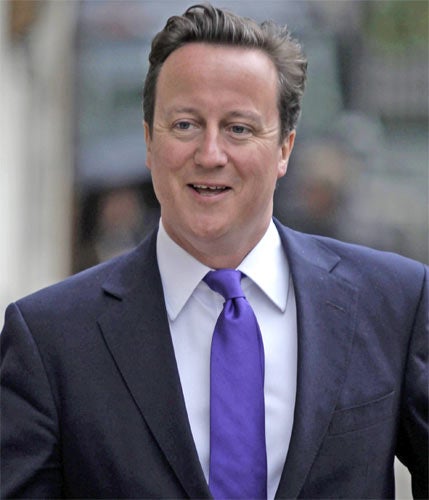David Cameron warned today that the Government's NHS reforms were essential to avert a £20 billion funding shortfall by 2015.
Signalling his determination to press ahead with the highly controversial changes, the Prime Minister insisted the status quo was "not an option".
Speaking to NHS staff at Ealing Hospital in west London, he proclaimed his own "love" for the health service and declared that the reforms were in the "national interest".
But he claimed that the rising costs associated with an ageing population and increasingly expensive treatments could not be ignored.
"If we stay as we are, the NHS will need £130 billion a year by 2015 - meaning a potential funding gap of £20 billion," he said.
He ruled out additional Government borrowing, or asking people to pay at the point of delivery, to fill the hole.
"There's only one option we've got, and that is to change and modernise the NHS, to make it more efficient and more effective, and above all, more focused on prevention, on health, not just sickness," he said.
"We save the NHS by changing it. We risk its long-term future by resisting change now."
Mr Cameron refused to "pre-empt" the outcome of the listening exercise launched by ministers in the face of widespread opposition to the reforms last month.
The NHS Future Forum, set up to oversee the process, will report recommendations at the beginning of June and the Government would respond later in the month, he said.
But he insisted the reforms would be "evolutionary, not revolutionary" and a "logical extension of tried-and-tested policies initiated by governments of all parties in recent years".
Seeking to reassure critics that the NHS would remain "much like what we have today", he went on: "Let me be clear - there will be no privatisation, there will be no cherry-picking from private providers, there will be no new upfront costs people have to pay to get care.
"Absolutely not. These are red lines we will not cross."
Under the proposals, groups of GPs would be handed control of around £60 billion-worth of NHS spending, with a remit to commission treatment and services from "any willing provider" - including private companies.
Labour and other critics warn that the changes open the health service to full-blown privatisation, a charge Mr Cameron and Health Secretary Andrew Lansley have been keen to counter.
Amid signs of deepening tensions in the Conservative-Liberal Democrat coalition, Deputy Prime Minister Nick Clegg has threatened to veto the legislation if GPs are forced to take on responsibility for commissioning.
Elements of the reforms are deeply unpopular among Lib Dem MPs and activists.
Mr Cameron said today that the NHS was "the most important thing" to his own family.
And he insisted that his own commitment to the NHS had only got stronger in recent years.
"It's because I love the NHS so much that I want to change it, because the fact is the NHS needs to change," he said.
"It needs to change to make it work better today, and it needs to change to avoid a crisis tomorrow."
But he insisted there were also problems with "waste and inefficiency", with "too much top-down control", "inflexibility" and regional variations in service.
He said the Tories and Lib Dems had come together in Government to act in the national interest - a commitment both parties took "very seriously".
"It's that commitment to act in the national interest which means we will also modernise our NHS," he said.
Union leaders restated calls for the Health and Social Care Bill - which will enshrine the reforms in law - to be scrapped.
TUC general secretary Brendan Barber said: "The Government's plans to 'modernise' the NHS will cost billions at a time when hospitals are being expected to find substantial efficiency savings.
"The end result will be a worse service for patients as private sector firms, led by the huge multinational companies, rush in to secure the most profitable services for themselves."
The Unite union's national officer for health Rachael Maskell said: "David Cameron in his speech today was long on rhetoric, but short of specifics.
"This was a PR exercise in verbal gymnastics due to the political pressures he is under, especially from his Liberal Democrat allies."
Subscribe to Independent Premium to bookmark this article
Want to bookmark your favourite articles and stories to read or reference later? Start your Independent Premium subscription today.


Join our commenting forum
Join thought-provoking conversations, follow other Independent readers and see their replies